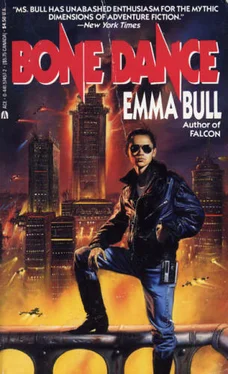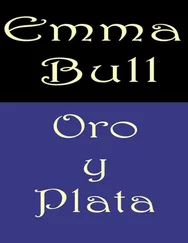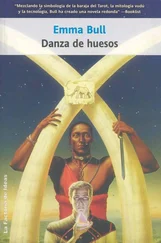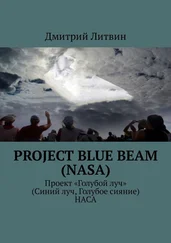Slowly, Frances got out of the trike. Her face was full of resigned and weary disgust, and her hands were empty.
“Leave the key,” the woman said. “Etienne will drive your vehicle after us.” Etienne—the one in the hat.
“If Etienne wrecks it,” said Frances, toward the driver, “I will eat Etienne’s liver. If I have to come back from the dead to do it.”
Etienne smiled and nodded, as if he thought that was reasonable.
Mr. Lyle gestured Frances into the back, and she slid onto the other rear-facing seat. Not for Frances the indignity of being tossed in like a piece of luggage. He pushed Mick’s unresisting body farther along the upholstery, and closed the door. Somewhere inside it a lock chunked.
Mr. Lyle took the driver’s seat, and the dog wagged its tail once, briskly. The trike did not explode when Etienne started it. As we pulled into the street, I watched its two close-set headlights swing and settle in behind us.
Frances had rescued me once; against all reason, I had expected her to do it again. “You didn’t shoot them,” I said finally, watching her.
She’d let her head drop back to rest against the glass partition, and her eyes were closed. “No. I didn’t.”
“Or ride them. Or even drive the hell away. Why not?”
“You sound as if you’re taking it personally.” She opened her eyes and rolled her head to look at me. The lights of the trike slid and shuffled over her face, and I saw her eyes clearly for a moment, all pupil. “I found, on examination, that I couldn’t afford it.” She turned her face back toward the roof and closed her eyes again.
Her nose was short, and tilted up a little at the end. But then, it wasn’t her nose. “Are you ever going to let her back out?” I asked sharply.
“Who?”
“The person whose body that is.”
I thought she wasn’t going to answer. The pause was attributable, perhaps, to thinking. “No. Either way, no.”
“Either way?”
But that, she didn’t answer.
Outside it was dawn, a light so fragile that it seemed a strong wind could break and scatter it. On the edges of the City, people would be gathering the things they would bring to market: peppers, poultry, straw hats, water jugs, fabric dye, burn ointment, door hinges. On Loring Common, the milking would be finished; the heavy-shouldered, lyre-horned cows would be plodding out of the shed to graze. The milk would be on its way to market soon. I was on my way to… where? Someplace safe, where we could talk. What if I had nothing to say?
The long black car passed out of the gates of the Night Fair. Somewhere in the City Theo and Sher were alive, or dead. Myra and Dusty and Dana and Cassidy were doing whatever they pleased, or could get away with, or thought they had to. To them, for now and maybe forever, the three people in the back seat of the limousine were irrelevant. I wedged myself in my corner of the car and wrapped my arms around me. I wouldn’t, had I been asked, have said I was cold.
In the morning light, the Schmidt beer cap sign looked as if it had been painted on the sky behind it. The suspension bridge, its cables looping like the flight of swallows, ran above and below us. If La Maitresse hadn’t intercepted us, we’d have gone this way anyway; the Underbridge was on the other shore, east along the river.
Then the car slowed and turned, and I straightened up and pulled my gaze down from overhead. We’d turned off—not on the other shore, not quite as far as that.
I stared, and breathed, “We’re on the island.”
“I know,” Frances said. Her head was up and her eyes open. “What, then?” She must have understood me from my voice; hers was low and level. I saw in her face the effort to focus her mind, to gather up her scattered reserves and hold them ready.
“The place has unreasonably high ju-ju levels. For instance, they say if you don’t belong, or weren’t invited, you won’t be able to turn off the bridge onto this street.”
“The ultimate private subdivision.”
I shrugged. “Don’t believe it, then.”
“I almost do, actually. This always was an oddity sink. Maybe someone’s found a way to use it. Do you believe it?”
“I’ve never had business on the island.” That was true. There was no reason to mention the times when, on the way to or from business elsewhere, I’d intended to test the folk wisdom, and forgot the intention until I was on the other side of the river. I wished I’d been paying more attention to where we’d turned off.
“I’ve been here,” Frances said. “Before… The row houses look the same. I wonder who lives in them.”
We were on an old brick street that followed the edge of the island. To our left, the river ran gold in the morning light. The row houses were on our right, a handsome old block of gray stone and long windows, glossy doors with brass hardware. We drove past. Trees hung heavy over the road and shrubbery grew up between them, making a dim green tunnel. Sometimes we saw an opening, with a dusty gravel drive; sometimes a house and yard behind the weathered pickets of a fence. Once three chickens scrabbled out of the road in front of us, scolding.
“It was always a little wild,” Frances said softly behind me. “But never so wild as this.”
I thought I knew what she meant. People lived here; but it was as if the land had gathered itself around them, veiling and swaddling them, hiding them and the signs of their habitation. If I hadn’t been on the outside of it, it might have seemed benevolent.
The car turned and nosed up to a peeling wooden double gate in a piebald wall of round stones and mortar. Ivy and clematis were turning the wall into a hill of shifting green starred with crimson. There was a flash of yellow on the other side of the gate, and it swung open to reveal an elderly woman in a yellow dress. She made a half bow to the car in general. The people in the front seat smiled at her. Since my window was one-way glass, I didn’t feel I had to.
Then we were on the other side of the wall; and if what we’d passed through was wild green, this was its civilized cousin. It was solid garden on either side of the gravel drive. There were fruit trees and flowering ones; the dense, druglike smell of mock orange and butterfly bush, strong even in the car; a mass of tall orange and yellow flowers like a streak of fire; grapes hanging heavy and green on a long arbor; the red cones of hot peppers set like jewels in their bushes. There might have been paths or terraces of grass, but I couldn’t see them from where I was.
And in the middle, a somber monarch in some highly ornamental court, was a three-story, sprawling wood-frame Victorian house. It was mostly dark green, trimmed in black, brick-red, and yellow. Once, maybe, it had been of modest size, before the gables and dormers and bays, the additional rooms and entire wings. It should have been awful; instead, it had a sort of rhythm, as if half a dozen dissimilar people had agreed to dress alike and dance in figures.
“I would swear,” Frances said, “this wasn’t here when I left.”
“How the hell long ago did you leave?”
“I know. That house is a lot older than I am. Still…”
By that time, the car had stopped at the broad front porch, and the tri-wheeler had pulled up behind us. Mr. Lyle got out, the dog following with a great lazy spring, and opened the passenger door for the woman. He performed the same office for Frances, as his—employer? partner?—went briskly up the steps, the sound of her heels uncompromising on the wood. She turned at the top.
“I think,” she called back, “that you should carry your friend. It will be more work than it would be for Mr. Lyle, but it will keep you from trouble.”
Frances stood in the angle of the open door and looked in at me. She seemed torn between amusement and frustration. “Let us, by all means, be kept from trouble. Would you like the head or the feet?”
Читать дальше












